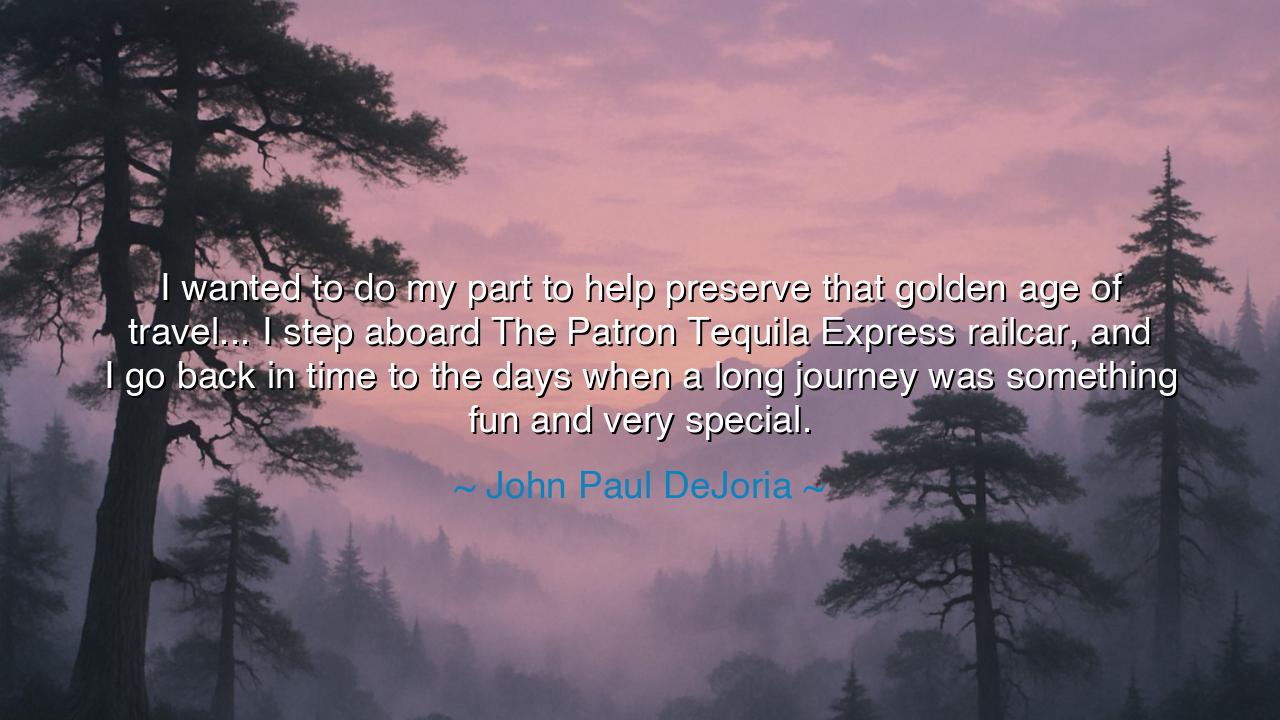
I wanted to do my part to help preserve that golden age of
I wanted to do my part to help preserve that golden age of travel... I step aboard The Patron Tequila Express railcar, and I go back in time to the days when a long journey was something fun and very special.






Hear the words of John Paul DeJoria, a man who built empires yet did not forget the romance of life’s journey: “I wanted to do my part to help preserve that golden age of travel… I step aboard The Patron Tequila Express railcar, and I go back in time to the days when a long journey was something fun and very special.” In these words lies not merely nostalgia, but a longing for the sacred joy of adventure, a yearning to honor the beauty of the past while carrying it into the present. His voice speaks of more than trains and railcars—it speaks of memory, tradition, and the spirit of wonder that once made every voyage a story worth telling.
To speak of the golden age of travel is to invoke a time when the journey itself was not simply endured, but celebrated. When men and women boarded ships, trains, and grand liners, not to rush past landscapes, but to dwell in them. The journey was part of the dream, a pilgrimage filled with music, dining, conversation, and awe. In that age, the pace of life was slower, the distances longer, but the human heart felt the richness of movement, the poetry of motion itself. DeJoria reminds us that something has been lost in our age of speed, where travel is often reduced to inconvenience, a passage to be survived rather than cherished.
The Patron Tequila Express railcar, for him, is more than wood and iron; it is a vessel of memory, a time machine. To step aboard is to remember that travel once lifted the human spirit, turning strangers into companions, landscapes into living paintings, and arrivals into triumphs. In reviving this tradition, he offers not only himself but others a chance to recall that life is not merely about destinations, but about the moments between—moments filled with laughter, music, beauty, and the lingering sweetness of time well spent.
History too bears witness to this truth. Think of the Orient Express, that legendary train whose very name evoked mystery and luxury. To ride it was to step into another world, a moving palace where one tasted fine meals, watched endless horizons pass, and met souls from far-off lands. Or consider the great ocean liners, such as the Queen Mary, which carried not only passengers but stories across the seas. In those days, the voyage itself was a grand part of the human experience, not merely a pause between duties. DeJoria’s longing is for this spirit: that travel should be more than movement—it should be memory.
Yet his words carry more than nostalgia. They are a call to preserve what is beautiful before it fades forever. The golden age of travel represents something larger: the value of slowing down, of savoring life, of restoring the sacred to the ordinary. In a world of endless speed, where we rush from one place to another, the wisdom of his words reminds us that if we lose wonder in the journey, we risk losing wonder in life itself. For the way we travel reflects the way we live.
The lesson, then, is clear: do not let your days become corridors between duties. Make each journey, however small, into something meaningful. When you walk through your neighborhood, let your eyes drink in the sky, the trees, the faces of those you pass. When you ride a train or drive a road, treat it not as wasted time but as a chance to reflect, to converse, to see. Preserve the golden age not only in grand railcars, but in the way you choose to live every day—as a traveler savoring the road, not merely rushing toward the end.
Practical wisdom follows: create rituals that make your journeys sacred. Carry a book that nourishes your soul, or music that uplifts your spirit. Speak to those who travel beside you, for in them may lie the unexpected gift of friendship. Above all, cultivate gratitude—not only for the destination, but for the path itself. In this way, you do your part, as DeJoria does his, to preserve the wonder of travel and, indeed, the wonder of living.
So let his words echo across the rails of time: “I wanted to preserve that golden age of travel… I go back to the days when a long journey was something fun and very special.” Remember this truth: life itself is the longest journey of all. If you rush through it without savoring, you will arrive too quickly at the final station. But if you treat each step as a treasure, each moment as a voyage, then your life will not only be long, but golden.






AAdministratorAdministrator
Welcome, honored guests. Please leave a comment, we will respond soon